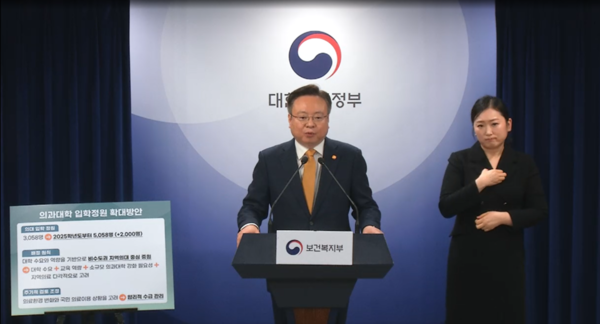The Ministry of Health and Welfare's announcement on Tuesday to increase medical school admissions by 2,000 students from the 2025 academic year has sparked a major backlash from doctors.
This marks the most significant expansion in medical education capacity in 27 years, elevating the current quota from 3,058 to 5,058 students.
The government's move seeks to mitigate the medical workforce shortfall, particularly in non-capital regions and essential healthcare fields, amidst an aging population and increasing medical demand. The aim is to address the projected shortage of 15,000 doctors by 2035.
The medical community, however, opposes this policy, with the Korean Medical Association (KMA) leading the charge.

The KMA has vehemently criticized the government's unilateral approach, scheduling an emergency press conference and threatening a comprehensive strike. Surveys among resident doctors have shown an overwhelming majority opposed to the expansion, with 86 percent indicating their willingness to engage in collective action, including strikes.
In a direct confrontation with the government's policy, KMA President Lee Pil-soo announced at a press conference, "If the government proceeds with the unilateral expansion of medical school admissions, violating the spirit of the September 4 agreement made in 2020 without consultation and communication, the whole KMA's 41st executive committee will resign, immediately convene an emergency general assembly, and form an emergency response committee to launch a general strike."
Lee added that doctors have been open to dialogue and that the KMA is willing to negotiate on the issue of increasing admissions.
The KMA's response highlights a critical debate over the future of healthcare in Korea, balancing the need for more medical professionals to address regional disparities and the aging population against concerns over the impacts of rapid increases in medical school quotas on the quality of medical education and healthcare delivery.
The government's stance is backed by public opinion and political consensus across the spectrum, with a significant majority of the population in favor of expanding medical school admissions to alleviate doctor shortages and improve access to healthcare services.
Escalating tensions between the government and the medical community over the planned increase in medical school admissions prompted Health and Welfare Minister Cho Kyoo-hong to hold a press conference and robustly defend the government's decision.
He outlined the dire need for more medical professionals to tackle the challenges of an aging population and regional healthcare disparities.
"To meet the healthcare needs of our aging population and ensure adequate medical staffing levels by 2035, we decided to increase the medical school quota," the minister said. "We predict a shortage of 10,000 doctors, even after considering the need for approximately 5,000 doctors to address healthcare vulnerabilities in certain areas."
Minister Cho elaborated on the government's strategy to allocate the increased admissions primarily to medical schools in non-capital regions, highlighting the importance of strengthening healthcare capabilities across the country.
"We are committed to a fair and effective distribution of the increased quota, focusing on non-capital region medical schools," Cho said. "This approach considers the submitted demand from each university, their educational capacity, the need to enhance the capabilities of smaller medical schools, and the necessity to support regional healthcare."
Addressing the medical community's resistance and the potential for strikes, Minister Cho stated that the government has prepared emergency medical service measures and will respond firmly to any illegal actions, including strikes.
"We are proceeding with a sense of grave responsibility, understanding the critical importance of securing a sufficient medical workforce for the future," he said.
Minister Cho also highlighted the government's intention to ensure that a significant portion of admissions to medical schools outside the capital region would be filled through regional candidate selection processes, aiming for over 60 percent local recruitment.
"This policy will not only address the current medical workforce shortage but also encourage the development of healthcare services tailored to the needs of each region," Cho said.
Related articles
- [Analysis] Why do Korean students obsess over admission into medical schools?
- Trainee doctors threaten to quit in protest to sharp increase in med school students
- Government dispels election rumors surrounding medical school enrollment increase
- Why Korean doctors oppose increase in medical school admission quota
- Trainee doctors at ‘Big 5’ hospitals to resign en masse on Monday
- Government pressures medical schools to disclose student information amid collective leave of absence protest

